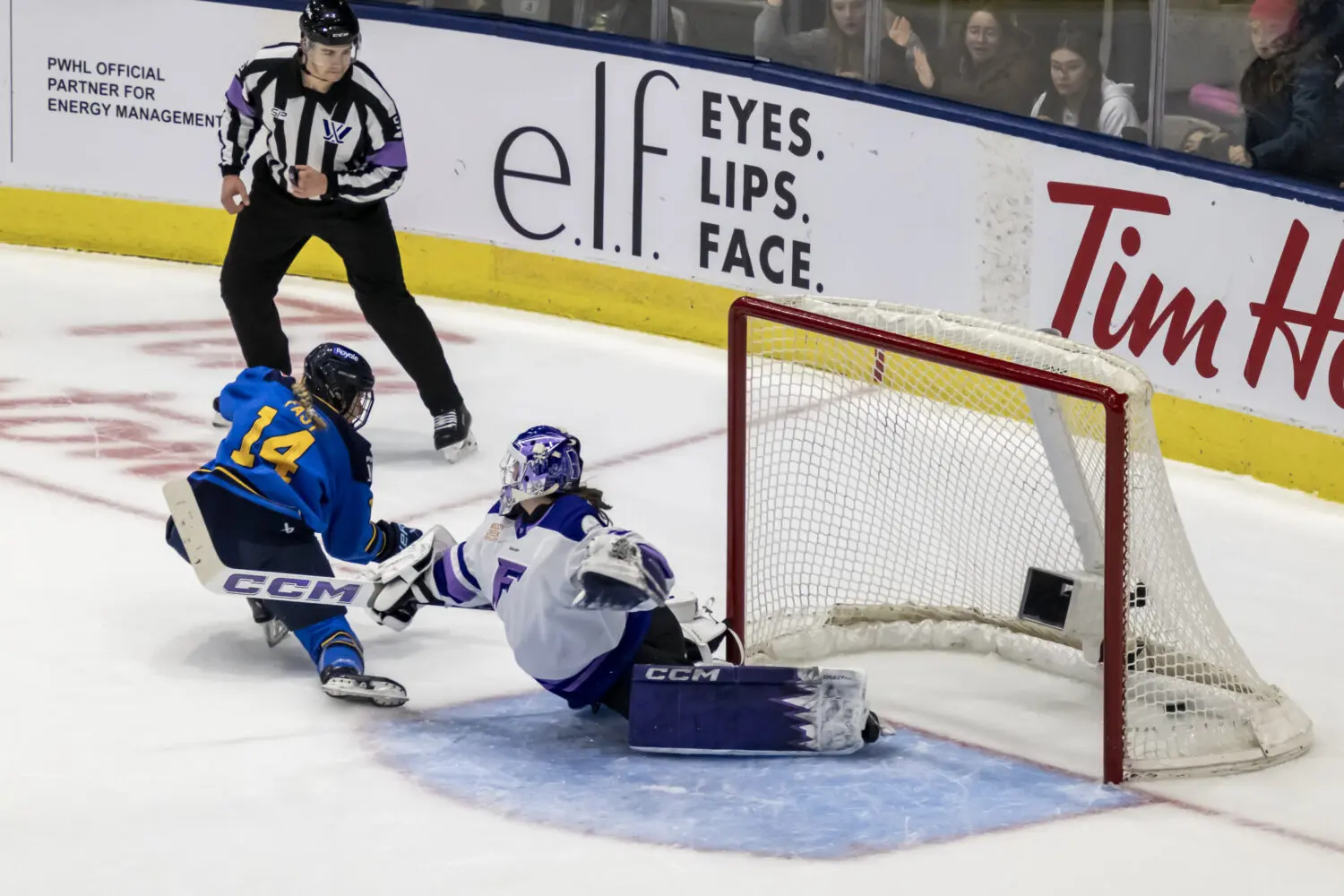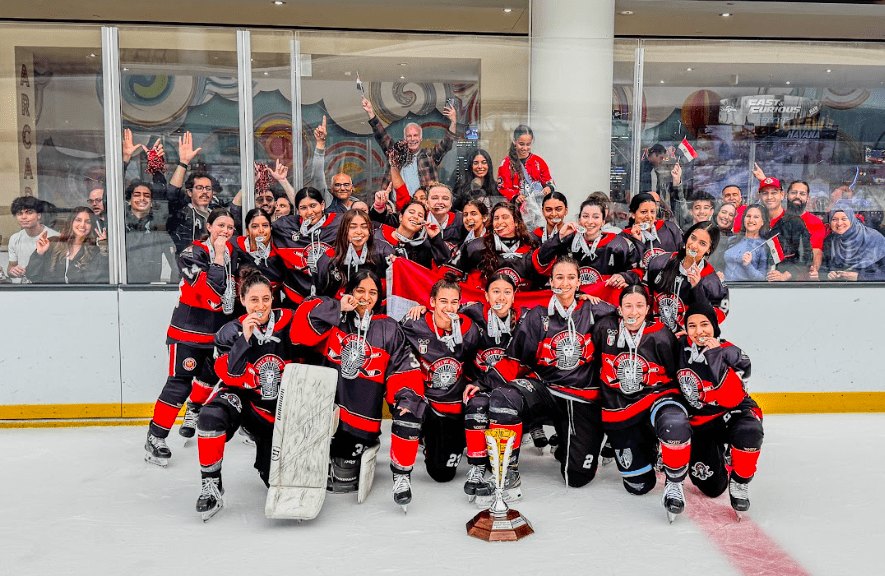A storm is coming to the U.K.’s English Women’s Elite ice hockey league—London’s Streatham Storm. This past May, the Streatham Storm’s Premier team clinched the English Women’s Premier League title with a 12-1 win over the Chelmsford Cobras, earning promotion to the Elite League for the 2017/18 season.
The Streatham Storm, a club which was formed in 1996 and plays out of the Streatham Ice and Leisure Centre, has two teams, the newly promoted Premier team and a Division One South team. The current structuring of women’s hockey in England, with Elite, Premier, and Division One leagues, is a recent development. The two Division One leagues—one covering the north of the country and the other the south—have existed for quite some time, but until recently the Premier League was the top league. However, the difference in skill level amongst and between the leagues was very significant, and to improve the quality of play and competitiveness of the leagues, the top five Premier teams formed a new Elite League in 2015.
“This resulted in much more competitive and spectator friendly games as well as enhancing the credibility of women’s hockey in the U.K.,” said Storm player Joanna Li How Cheong.
Cheong, who played on the Premier team this past season, was originally a figure skater while growing up in Luxembourg. She discovered ice hockey while studying in Sheffield and joined the Storm in 2014.
Cheong’s teammate Hannah Carnegy, the captain of the Premier team, started playing hockey at the age of 10, playing mostly with boys until she turned 16 and was old enough to play with the Storm. Her experience is similar to that of most other girls in England, who play on boys teams until the age of 16, with some playing on one of the seven U16 girls teams spread throughout the country.
Promotion to the Elite League has been one of the main goals for the Streatham Storm. Growing awareness of the game of ice hockey in London (and the U.K. in general) has also been of extreme importance to them, and the Storm has seen as influx of new players over the past few years. The club has gained players from other countries as well, such as Canadian Jamie Endrizzi, a former York University player. The addition of these new players has helped increase the depth of the club.
“We had a very even team, with nearly every player scoring this year and no obvious weak link. For example, lines were not labelled ‘first’ or ‘third’ as the order did not matter and changed every game,” explained Cheong. “Unlike a lot of the other Premier League teams, this meant that we did not rely on ‘star’ players and had no weaker lines.”
The team’s success can be attributed to more than just numbers and on-ice skill however. The high quality individuals playing for and coaching the team have facilitated a winning environment.
“There is a fantastic atmosphere at the Storm, and this is something I’ve heard in particular from players who have come to us from other clubs,” said Carnegy. “We place a lot of emphasis on fostering a very open and collaborative culture, where we challenge and support each other in equal measure. We all want to be the best and are willing to learn from each other in order to do so.”
The club’s head coach, Sam Nicoll, has also played a huge role in not just this past season’s success, but the building of the club over the past several years.
“Sam brought a lot of energy and enthusiasm to the club, as well as the commitment to follow through on his ambitions to get the Storm to the top flight of U.K. women’s hockey,” said Carnegy. “Since then, he’s also brought in more assistant coaches and changed the structure of our practices, making them more dynamic.”
Nicoll, who coaches both of the Storm teams, is Canadian. “I played [street hockey] endlessly in front of my house and in the winter on the frozen tennis courts,” Nicoll said of his childhood growing up in Prince George, British Columbia. “[I] was hooked on the game and never missed one on TV.” Nicoll ended up coaching the Storm after several years of coaching with a youth club in London when one of the Storm players approached him.
“To my surprise, the club was in a state similar to the U12s [at the youth club] so many seasons ago,” said Nicoll. “Minimal numbers and we finished dead last, but there was such a good attitude and keenness, a love of the game that is infectious — just like my old kids team, and I fell in love again.”
“[The players] are so focused and determined with a priority on positivity. They worked so hard in practice, bought into the systems, and consistently strived to improve.” Nicoll is joined by assistant coaches Gus Zimmerman, Paul Sanders, Ritchie Crowe, and Mike Mendoza and club manager Hugh Carnegy.
The jump up to the Elite League is going to be a challenge, but it is one that the Storm players and staff relish. They will get to play more games each season—Premier League teams play 12 and Elite League teams play 20—and will experience faster and more physical games. While hockey is a niche sport in the U.K. regardless of gender, the Storm have recognized that they are going to face some additional monetary challenges in the Elite League, which will cost more to play in.
 “Where you see the difference is at the Elite level, where all the women’s teams are self-funded, whereas comparable men’s teams are able to find sponsors or generate funding from ticket sales,” explained Carnegy. “There is also sadly a tendency for women’s teams to get de-prioritized below the needs of men’s teams and even junior clubs.”
“Where you see the difference is at the Elite level, where all the women’s teams are self-funded, whereas comparable men’s teams are able to find sponsors or generate funding from ticket sales,” explained Carnegy. “There is also sadly a tendency for women’s teams to get de-prioritized below the needs of men’s teams and even junior clubs.”
The International Transfer Card (ITC) fees don’t help. Players not born in the U.K. need to pay a £600 fee in order to play in the U.K.’s women’s hockey leagues. This fee is on top of the fee to actually join a league as well as monthly team fees and travel expenses.
“This is particularly a problem for our club as it is based in London, which is a very multi-cultural city,” explained Cheong. “Even though many of our players have lived in the U.K. since a very young age and have learned to play in the U.K., this transfer fee is still necessary and is a barrier for experienced players as well as new players who would like to give it a try, but cannot join any teams.”
However, despite the many challenges, the Streatham Storm teams have proven their resiliency, their passion for the game, and their desire to excel. This club will be one to watch as they take on the English Women’s Elite League this fall.
For more information on the Streatham Storm, please visit their website at http://www.streathamstorm.net/
Photos courtesy of the Streatham Storm.
[adrotate group=”1″]
Related Articles
Categories
Recent Posts
[adrotate group=”2″]




